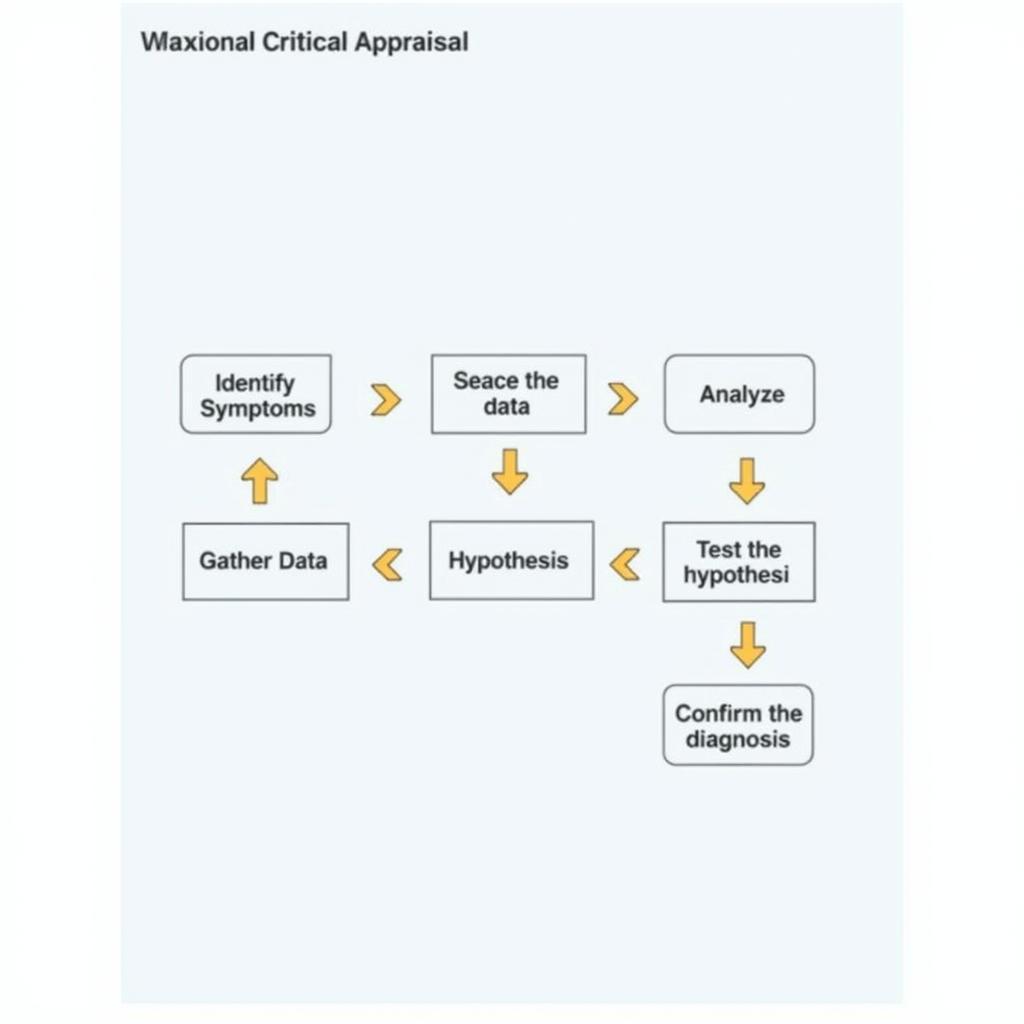A Diagnostic Critical Appraisal Tool is essential for any automotive technician or repair shop owner looking to efficiently and accurately diagnose vehicle issues. In today’s complex automotive landscape, simply relying on experience or guesswork isn’t enough. Using a structured approach like a diagnostic critical appraisal tool can save you time, money, and frustration, ultimately leading to more satisfied customers and a more profitable business.
Why Use a Diagnostic Critical Appraisal Tool?
Modern vehicles are intricate systems of interconnected components, both mechanical and electronic. A seemingly simple problem can have multiple underlying causes. A diagnostic critical appraisal tool provides a framework for systematically evaluating potential issues, eliminating guesswork and promoting efficient troubleshooting. Think of it as a roadmap guiding you through the diagnostic process, ensuring you don’t overlook crucial steps.
Benefits for Technicians and Shop Owners
- Improved Accuracy: By following a structured approach, you’re less likely to misdiagnose problems.
- Reduced Diagnostic Time: A systematic approach eliminates unnecessary steps and focuses your efforts on the most likely causes.
- Increased Efficiency: Faster diagnostics mean more vehicles serviced and increased revenue.
- Enhanced Customer Satisfaction: Accurate and timely repairs build trust and loyalty.
- Reduced Parts Replacement Costs: Avoid replacing parts unnecessarily by accurately pinpointing the root cause of the problem.
 Diagnostic critical appraisal tool flowchart
Diagnostic critical appraisal tool flowchart
Key Components of a Diagnostic Critical Appraisal Tool
A robust diagnostic critical appraisal tool incorporates several key elements:
-
Symptom Identification: Clearly define the problem. What are the specific symptoms the vehicle is exhibiting? Is the check engine light on? Are there any unusual noises or vibrations? Gathering as much information as possible upfront is crucial.
-
Data Collection: Use diagnostic equipment like OBD-II scanners, multimeters, and pressure gauges to collect relevant data. This data will form the basis of your analysis.
-
Hypothesis Formation: Based on the symptoms and data collected, formulate potential explanations for the problem. What are the most likely causes?
-
Hypothesis Testing: Systematically test each hypothesis using appropriate diagnostic procedures. This might involve checking wiring diagrams, testing sensors, or performing mechanical inspections.
-
Diagnosis Confirmation: Once you’ve identified the root cause, confirm the diagnosis by verifying that the repair resolves the original symptoms.
 Automotive technician using a diagnostic scan tool
Automotive technician using a diagnostic scan tool
“A good diagnostic critical appraisal tool is like having a seasoned mechanic looking over your shoulder,” says John Smith, Senior Automotive Engineer at ScanToolUS. “It helps you think through the problem logically and avoid making costly mistakes.”
Choosing the Right Tool
There are various diagnostic critical appraisal tools available, ranging from simple checklists to sophisticated software programs. The best tool for you will depend on your specific needs and budget.
How Diagnostic Critical Appraisal Tools Improve Troubleshooting
Using a structured approach eliminates the “shotgun” diagnostic method where parts are replaced randomly in hopes of fixing the issue. This haphazard approach is not only inefficient but can also be expensive. A diagnostic critical appraisal tool guides you through a logical process, ensuring you address the root cause of the problem, not just the symptoms.
 Mechanic checking car engine
Mechanic checking car engine
“Imagine trying to navigate a complex city without a map,” explains Maria Garcia, Lead Diagnostic Technician at a major automotive repair chain. “A diagnostic critical appraisal tool is your map to understanding the complexities of modern vehicles.”
Conclusion
A diagnostic critical appraisal tool is an invaluable asset for any automotive professional. By promoting a structured and systematic approach to diagnostics, these tools enhance accuracy, reduce diagnostic time, and ultimately improve customer satisfaction. In the fast-paced world of automotive repair, adopting a diagnostic critical appraisal tool is no longer a luxury, but a necessity. For any questions or support regarding diagnostic tools, feel free to contact us at ScanToolUS at +1 (641) 206-8880 or visit our office at 1615 S Laramie Ave, Cicero, IL 60804, USA.

